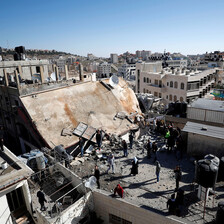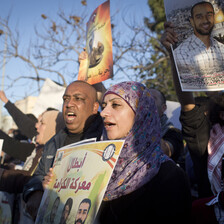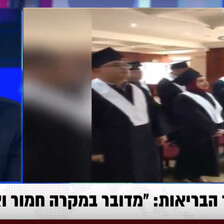The Electronic Intifada Qalandiya refugee camp 7 March 2016
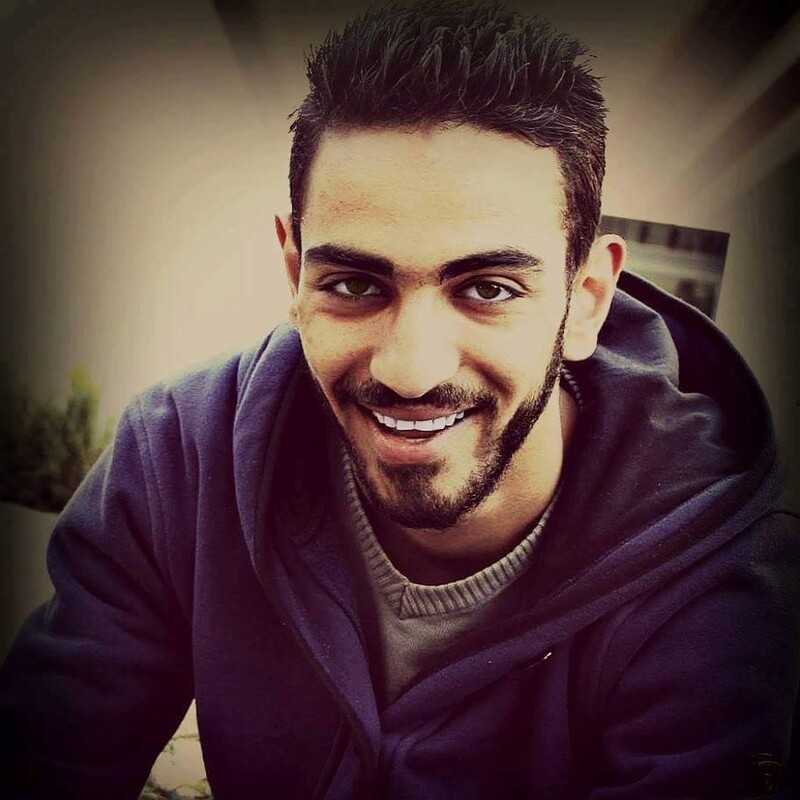
Iyad Sajadiyya (via Qalandiya Media Center)
Iyad Sajadiyya had worked hard to make his way through college.
To pay his tuition fees, he had a job in a clothing store serving Qalandiya refugee camp in the occupied West Bank. He was working there on Monday, 29 February, when two Israeli soldiers drove into the camp, reportedly by mistake.
“We immediately shut down the store to see what was happening,” said a coworker, who asked not to be named. “Later, we saw a massive number of troops storm the camp so we began marching through the camp’s market while chanting.”
Israel invoked the so-called Hannibal Directive after the soldiers were separated from their vehicle and it was attacked by some of the camp’s residents. Under that directive, the Israeli military is authorized to use huge firepower with the objective of preventing a soldier being captured alive.
Local youths were singing “Paradise, paradise, our homeland is paradise” when the clashes with the Israeli army began. Inspired by slogans used during protests in Syria five years ago, this song has become an anthem of the latest Palestinian uprising.
Iyad was being chased by the Israeli army that Monday evening when he and two friends knocked on the door of Um Muhammad, an elderly woman.
“I welcomed them in and gave them water and asked them to stay as long as they wanted,” she said. “If I knew that this skinny kid [Iyad] would be shot, I would have never allowed them to leave my home.”
After a short time in that house, Iyad and his friends climbed onto some nearby rooftops. They were hurling rocks at the Israeli military when Iyad was shot in the eye.
“This is heaven”
One friend had asked Iyad to be careful on the rooftops shortly before he was killed.
“He replied, ‘just look at the sky, look how beautiful the stars are and don’t be afraid of anything,’” the friend said. “He also told me: ‘from here we can see Jaffa and imagine ourselves lying on its wonderful beach, this is heaven.’”
It was not unusual for Iyad to rhapsodize about the coastal city Jaffa, which Palestinians in the West Bank are banned by Israel from accessing.
Omar Eid, another friend of Iyad, said that Iyad’s favorite trip was one that they made to Jaffa. “He loved the sea and whenever he felt down, he would just think of that that day we spent in Jaffa,” Eid added.
Yet as well as being a dreamer, Iyad had a determination to get things done.
A journalism student, he had planned to start writing up a final university project in early March. It would examine how Israel’s intelligence agency, the Shin Bet, entraps young Palestinians and pressures them to become collaborators.
“His mission was to expose Israel’s crimes and to discuss sensitive issues that many do not talk about publicly,” said one his friends.
Iyad was due to graduate from Al-Quds University in May. He would have turned 22 that month.
The Sajadiyya family have a history of being dispossessed by Israel. They hail from Saraa, a village south of Jerusalem that was ethnically cleansed by Zionist forces in 1948. Iyad was born and raised in Qalandiya.
“You cannot grow up in the camp without fighting for the Palestinian cause,” said Omar Sajadiyya, Iyad’s father, who works as a guard at a United Nations school. “I participated in the first intifada. And seeing those guys thwart the Israeli army with rocks — in order to defend our camp — reminds me of what our generation used to do 30 years ago.”
As well as confronting Israeli soldiers, Iyad documented the reality of occupation.
He was a founder of the Qalandiya Media Center, which was launched last year. The center promotes “citizen journalism,” through which ordinary people record instances of repression with mobile phones and similar devices.
“We are all volunteers who decided to create this independent media center without waiting for funding and donor money,” Aseel Eid, a journalist and co-founder of the center, said.
Whenever Israeli soldiers raided the camp, Iyad reached for his mobile phone. He would upload his videos onto the center’s Facebook page.
“Forget about fear”
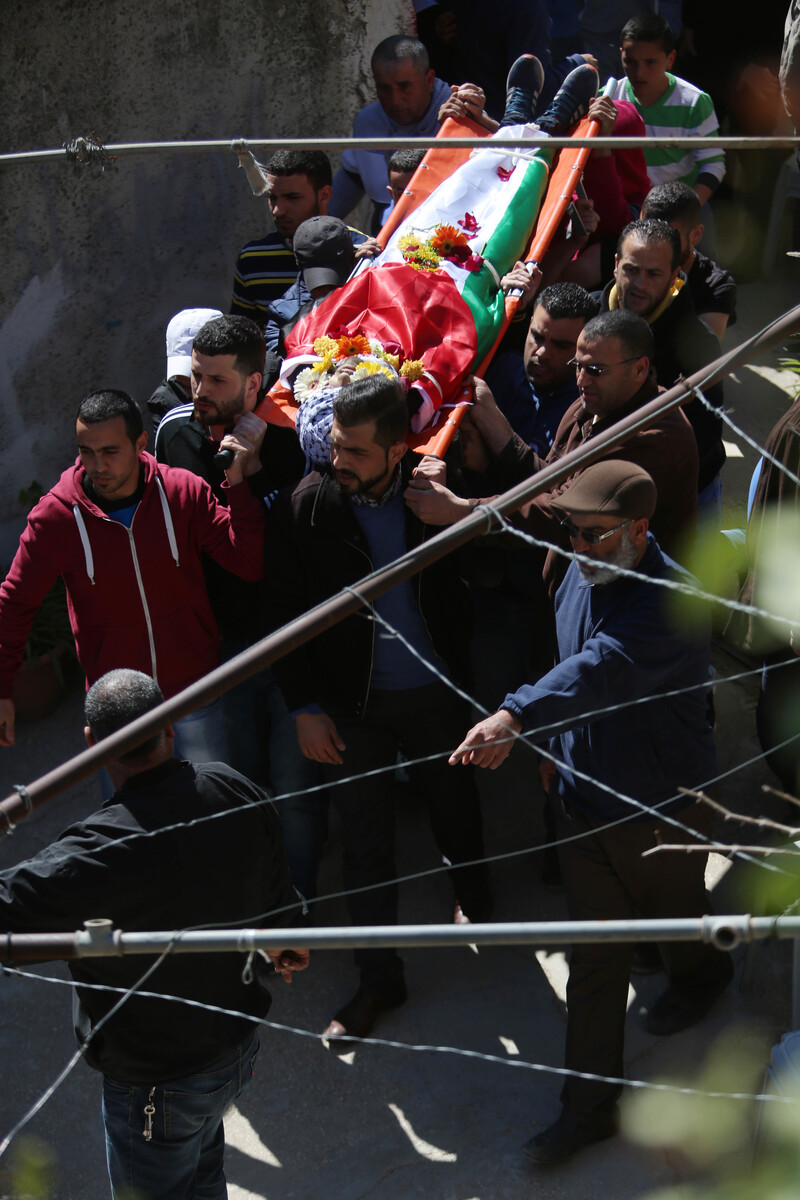
The body of Iyad Sajadiyya, wrapped in a Palestinian flag, is carried through the alleys of Qalandiya refugee camp during his funeral on 1 March.
APA images
“Our job is never safe but when your goal is to get the truth out, you forget about fear and just shoot the video,” said Maysa Ayad, another founder.
In addition to Iyad, two more of the media center’s founding members have been shot dead by Israel since October 2015. Ahmad Jahajha and Laith Manasra were slain during alleged attacks against Israeli forces.
Iyad filmed the fierce confrontations in the camp following the killing of Jahajha in mid-December.
“Losing our colleagues to Israel’s bullets increases the burden of responsibility on our shoulders,” said Maysa Ayad. “We know that we cannot afford to be lazy or complacent and that we have to work even harder not just for the camp’s sake, but also because improving our center’s work is the best way to honor our friends’ legacies.”
Iyad also had a reputation for championing the vulnerable. “He was particularly generous towards people with [developmental] disabilities,” said Qalandiya resident Raed Hamdan. “At a time, when many in the camp would ignore or mock them, Iyad used to welcome them to the store and give them cookies.”
Sabah Sajadiyya, Iyad’s mother, is desperate to find out as much as she can about Iyad’s last moments. Each time a young person from the camp expresses their sympathy, she asks if they were near Iyad when he was killed and what details they know.
“He never boasted,” Sabah said. “Nor did he like to praise himself or talk much about his work. But I’ve always been proud of him. And now that I see him again through his friends’ words, I feel closer to him than ever.”
Despite not being able to graduate from his studies in journalism, Sabah said that “he wrote with his blood all that he couldn’t articulate with words.”
Iyad wished to be buried blanketed with a Palestinian flag. He did not align himself with any political faction.
“Defending your homeland is the most instinctive response when you see military jeeps and armed soldiers invade your home,” said Nasser, Iyad’s uncle. “And Iyad was one of those residents who stood up to defend his camp.”
“Iyad defended the camp with both the camera and the rock,” said the Qalandiya Media Center’s Aseel Eid.
According to the center’s volunteers, 12 people from the refugee camp have been killed since the current uprising began in October last.
“Every mother in the camp risks losing her son,” Sabah said. “So we all understand each other’s pain.”
Budour Youssef Hassan is a Palestinian writer and law graduate based in occupied Jerusalem. Blog: budourhassan.wordpress.com. Twitter: @Budour48
